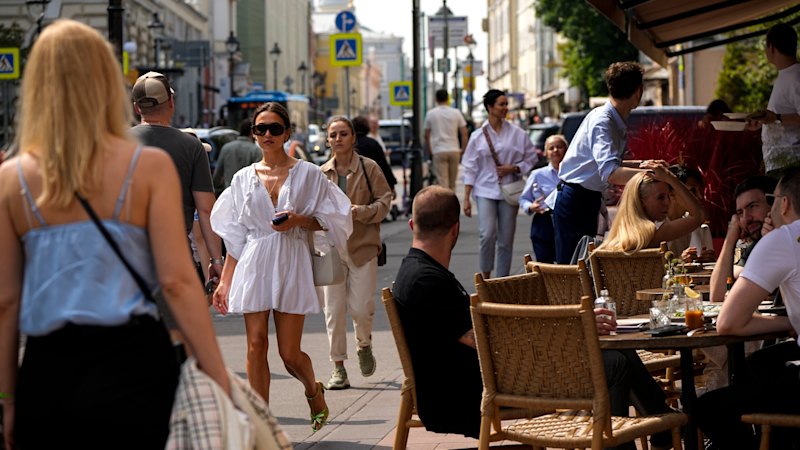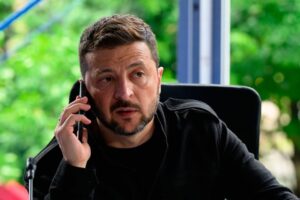
The Russian city of Volgograd was the location of one of the bloodiest fights in world history. The seven-month-long Battle of Stalingrad, as the city was known in 1943, claimed half a million Soviet lives.
More than 80 years later, the Russian version of Facebook is awash with government ads encouraging men in the city to join today’s war effort in Ukraine.
“Men aged 18 to 63, we consider those with diseases – HIV, hepatitis. We accept those on parole and convicts,” reads one such ad on Vkontakte, or VK, as it is known.
Military families are receiving big cheques while their men are on the front lines.Credit: AP
Having flat feet, an intellectual disability or being a foreigner also need not be a disqualifier, it adds. In return, big prizes await.
One advert offers 8 million rubles ($154,210) for the first year of military service – more than 10 times the region’s average wage of 712,883 rubles ($13,740) last year.
This includes hefty sign-on bonuses, extra payments for those with children and other perks such as priority nursery places, discounted mortgages and tax breaks.
The payments are one example of how Russia’s war economy has created a new middle class in the country’s industrial heartlands.
Military families are receiving big cheques while men are on the front lines, many of them facing death.
Blue-collar workers’ wages have also surged following the invasion of Ukraine.
While money is a paltry way to make up for the death of a loved one, there are some Russians on the home front who do not want the war to end.
It comes as US President Donald Trump and European leaders try to broker a peace deal between Russia and Ukraine, seemingly with little success.
Running out of patience with Moscow’s tricks and bombardments, Ukrainian President Volodymyr Zelensky warned: “They don’t want to end this war.”
While the comment was aimed at Russian leader Vladimir Putin, Russians lifted out of poverty as a result of the conflict may also feel apprehensive. For many of the new middle class, they cannot afford peace.
‘They are getting respect’
When Russia invaded Ukraine in February 2022, many Western economists predicted it would face impending economic collapse in the face of the world’s harshest sanctions.
For some Russians, life has improved as the war in Ukraine approaches its fourth anniversary.Credit: AP
As the war approaches its fourth anniversary, the economy is under strain – but there has been no crisis. If anything, for some Russians, life has improved.
The biggest benefactors are impoverished industrial areas that have suffered decades of decline, experiencing a fate similar to once-wealthy parts of the West.
Many towns and smaller cities across Russia that relied on a single industry, such as defence or manufacturing, never recovered after the fall of the Soviet Union in 1991.
“In the years after the dissolution of the Soviet Union, these areas went into decline, and people struggled to find jobs. But the facilities were still there,” Oxford Economics’ Tatiana Orlova says.
A safer world meant the need for ammunition, guns and other types of manufacturing had faded. That was, until Putin brought war to Europe.
“All that changed three years ago when the Russian leadership realised that it could not wrap up the war quickly. So it started moving the economy into a different mode,” Orlova says.
“Suddenly, these mothballed industrial facilities were hiring new workers, and new investment started flowing. These enterprises were competing with other sectors for workers, and they were offering good wages.”
Factories under pressure to churn out goods to support the war – munitions, uniforms and so on – started running three shifts a day.
Meanwhile, hundreds of thousands of working-age men joined the military, and Moscow restricted immigration – creating crippling worker shortages.
The result can be seen in wage data from Russia’s statistics office, Rosstat. Pay has surged in sectors related to the war effort, while other professions typically lucrative in peacetime have suffered.
Wages for workers making “finished metal items” rose by 78 per cent before accounting for inflation between 2024 and 2021, the fastest of any occupation.
Factories are under pressure to churn out goods to support the war.Credit: AP
In contrast, healthcare workers such as doctors and nurses and employees in the oil industry have seen the slowest growth, at 40 per cent and 48 per cent respectively.
“If you look at teachers or doctors, the increase is much, much smaller than in manufacturing,” Orlova says.
Putin has in effect done what Trump has promised American voters: created well-paid factory jobs en masse in the poorest parts of the country. Workers with no education and few skills are benefiting.
“These people live in underdeveloped regions. They work in once-underperforming industries. They don’t have higher education. But now these assets and skills are in demand,” Ekaterina Kurbangaleeva, a visiting scholar at the George Washington University in Washington says.
“They are getting higher salaries. Their savings are growing. And they are also getting social respect.”
It is a good time to be a Russian factory worker. But the real money comes if you join the military.
“When a man in the family joins the army on a military contract, first of all he gets his bonus and he starts getting monthly wages. The wages are decent. All that money started flowing mostly into the Russian regions because people are less keen to sign up for the contractual army in the big cities,” Orlova says.
“I call this deathonomics,” Russian economist Vladislav Inozemtsev says. He co-founded the Cyprus-based Centre for Analysis and Strategies in Europe in 2023 alongside Dmitry Gudkov, one of the leaders of the Russian opposition in exile.
“This was actually a fascinating know-how on the part of Putin’s regime because he transformed the lives of – I’d say very impolitely – people [who were] kind of social waste, into a vehicle for economic development.
“These people were almost useless. Many of them had no work in the small towns and villages and were conducting a very anti-social way of life. Then all of a sudden, these people were taken out of the environment.”
The environment in which they now find themselves – a war zone – is a grim one. But Inozemtsev believes many of those left in Russia will have little sympathy.
“In some cases, I would say their neighbours were absolutely happy they disappeared from their lives. Their relatives got a lot of money and became quite prosperous people in their local communities.
A pro-Kremlin activist holds a flag with an image of Russian President Vladimir Putting near the Kremlin.Credit: AP
“You take useless resources from the economy and you pour money instead of that. But of course, this all is only a temporary solution because the stock of these people is limited.”
Soldiers are offered big financial incentives to join the army, ranging from sign-on bonuses to debt forgiveness.
“Russian regions have been literally competing to sign people on military contracts. They got targets from above, and they had to fulfil them. They started offering sign-up bonuses in central regions, which reached something like $US25,000-equivalent ($38,566) in rubles,” Oxford Economics’ Orlova adds.
One can catch glimpses of how the lure of the big financial rewards is playing out across Russia on Vkontakte.
A 23-year-old married father asks in a group discussing the military effort where he can get the most money by signing on, adding that he has heard in some areas families wait months for the payments.
Others express remorse. “I stupidly signed the contract, now I don’t need the money. I don’t know what to do, I’m not a warrior at all. I’m 21 years old,” one man despairs.
While the soldiers receive handsome salaries and bonuses, the biggest financial rewards come in death. Families of Russian soldiers killed on the front line are entitled to payouts of up to 11 million rubles – equivalent to around $212,181.
This includes an automatic “presidential” payment of 4.9 million rubles, insurance worth 3.3 million rubles and a “governor” payout of up to 3 million rubles, according to independent Russian economic news outlet The Bell.
Officials from Russia’s ruling party have also been known to hand bereaved mothers and widows gifts, ranging from fridges to bags of onions to meat grinders.
On Vkontakte, a user whose account has been deleted replied to the 23-year-old father, urging him not to sign up as he would be “cannon fodder”.
“Stay home, I buried mine, he died on his first mission. Enough deaths already,” another message reads.
Coming in from the cold
The influx of cash into Russia’s poorest regions has helped fuel a spending boom, as impoverished families have suddenly come into money.
The influx of cash has fuelled redevelopment in some of Russia’s poorest areas.Credit: James Hill/The New York Times
“Many soldiers came from the very poor regions. This provoked a huge increase of real disposable incomes in very remote and poor regions in Russia like the Republic of Altai, the Republic of Tuva and some others – mostly North Caucasus and Siberia regions,” Inozemtsev says.
Families in tiny villages and small towns received “enormous” sums of money by local standards, he says. Many bought apartments in big regional cities with better schools and universities for their children, he adds.
The influx of cash has also fuelled redevelopment in some of Russia’s poorest areas.
“It gave rise to development of services in the poor regions where people previously, for example, could not even think of spending money on something like a monthly gym subscription,” Orlova says.
“Suddenly, new gyms and beauty salons started springing up. More cafes and restaurants opened as well. People really started spending on services.”
‘Suddenly, these mothballed industrial facilities were hiring new workers, and new investment started flowing.’
Visa restrictions and high costs mean foreign holidays are out of reach for most ordinary Russians. Instead, domestic travel has flourished.
“The number of hotel rooms is increasing 15-20 per cent per year. The whole hospitality industry – hotels, restaurants, catering – is growing. So the salaries of waiters, chefs and hotel managers are increasing too,” says Kurbangaleeva.
And so, a new social class is emerging.
Experts like Kurbangaleeva point out that what we refer to as middle class usually reflects three things: income levels, education and social standing.
In other words, becoming middle class isn’t something that happens overnight.
In families where no one has gone to university, the barriers have been lowered substantially.Credit: Host Photo Agency via Getty Images
But there are signs of a bigger shift. One of the perks military families are entitled to is that soldiers and their children get priority access to Russia’s competitive public universities.
In families where no one has gone to university, the barriers have been lowered substantially.
“The Russian government imposed a special university admission quota for soldiers and their children. They can apply without contest,” says Kurbangaleeva.
“Before this quota, they had no chance. They don’t get a good education [growing up] or a high enough level of knowledge. So they could not compete with other children who live in big cities or go to better schools. They now face an obstacle-free road to apply to the best universities in the country.”
This year’s quota is 50,000 places across the country. Actual enrolment figures will only be available in September. However, last year nearly 15,000 students made use of the offer, up from 8000 in 2023.
Kurbangaleeva believes it is the start of a bigger trend. “The social hierarchy is changing right now,” she says.
‘Social disaster’
Putin has achieved what many Western leaders have failed at: lifting the fortunes of some of the very poorest in society in a short period of time.
The price? One million Russian casualties, and counting.
In recent weeks, the promise of an end to the war briefly seemed closer than ever. The Russian leader flew to Anchorage, in Alaska, to meet Trump on August 15, under the guise of peace negotiations.
Coverage was dominated by the images of Putin beaming as he strutted down the red carpet to engage in a warm handshake and chummy catch-up with America’s president.
If the war does end, Russians who have grown accustomed to much higher living standards may pay the price. Surviving soldiers returning from the front line and their families are likely to quickly slip back into their old lives, Inozemtsev believes.
“These people are not accustomed to accumulate and to save money. They will spend it in a year or two, and return to the type of life they were accustomed to. The service in the army will not change your social behaviour,” he says.
“If 500,000 people will come back to the regions with very low wages and their savings from the service time will be exhausted in months, or in one or two years, it might be a huge social disaster.”
Such returns can prove hugely destabilising, as in Germany after the First World War in the 1920s. After returning from the war, Adolf Hitler founded the Nazi Party and assembled a private army made up of mostly unemployed and disillusioned veterans.
The collapse of the Soviet Union was in part driven by the end of the Afghan war, experts also point out.
“It’s a big question for the government, for Putin – how to take care of those people after the war is over,” a Russian economist based in Europe who did not want to be named says.
“I wouldn’t be that optimistic about their future. The government will do everything to disseminate those people and not allow them to turn into a powerful group. Cynically, the Russian political class have experience, or at least prior knowledge of how to deal with that.”
Other workers who have benefited from the war are also likely to take a hit once the economy normalises. Blue-collar workers, business people buying up stranded Western assets and state employees working in law enforcement are all likely to lose out in a demobilised economy.
“All these people are not interested in the return to peacetime,” Kurbangaleeva says. “It seems to me that the Russian authorities feel that. These beneficiaries would be more confident if they could sustain the current situation, because when and if the war ends, a lot might change.
“For them, it’s more beneficial to continue.”
While the summit in Alaska was billed as an effort for peace, Putin made sure to dangle the promise of lucrative commercial deals in front of Trump at the brief press conference that followed their talks.
“When the new administration came to power, bilateral trade started to grow. It is clear that the US and Russian investment and business co-operation has tremendous potential,” the Russian president said.
“My best guess is that Putin is trying to sow division between the US and Europe,” Brookings Institution’s Robin Brooks says.
US exports to Russia so far this year have jumped by a fifth compared to the same period of 2024. Much of that is pharmaceuticals and medical products. Sales going the other way – including nuclear materials and fertilisers – are up by one-third.
Putin’s strategy may be to make Zelensky’s and Europe’s concerns seem like a sideshow compared to the real business of carving up resources, whether in Russia’s far north or in newly conquered lands in Ukraine.
“Trump is a real-estate guy, and Russia has a lot of real estate and a lot of resources. Why don’t we strike a great deal on that?” Berenberg Bank’s Holger Schmieding says of Moscow’s approach.
Putin made sure to dangle the promise of lucrative commercial deals in front of Trump.Credit: AP
“From all we know about Trump, that appeals to his gut reactions – who cares about laws and rules, there is land, there is stuff you can make money on, there is someone with whom he can strike a business deal.”
As a result, many fear peace is no closer. That means more misery in Ukraine – but there will be those cheering in Volgograd.
“It’s easy to begin the war, but it’s so hard to end it,” Kurbangaleeva says.
The Telegraph, London
Get a note directly from our foreign correspondents on what’s making headlines around the world. Sign up for our weekly What in the World newsletter.





